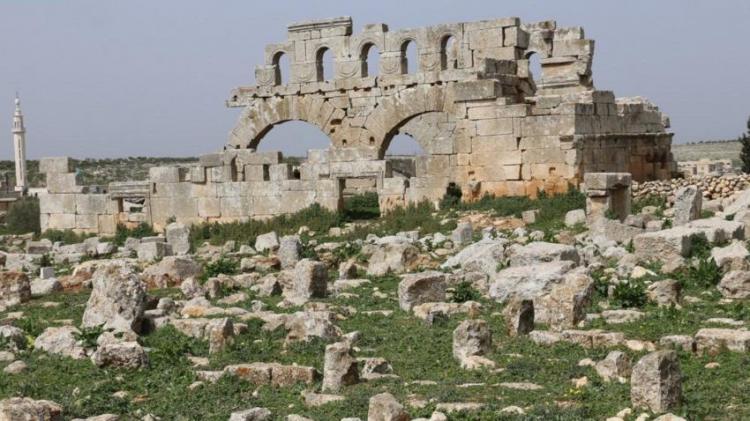"Al-Mahaj al-Maroni" in Afrin, from the destination of pilgrims to destruction and vandalism
Aleppo – North-Press Agency
Dejla Khalil
The archaeological site “al-Mahaj al-Maroni” (Maronite pilgrimage) in the village of Barad, 18km south of the city of Afrin, northern Syria, was recently exposed to excavation with heavy bulldozers by Turkey and the affiliated armed opposition groups, to uncover the treasures and archaeological finds, and convey them to Turkey.
Leaked footages were obtained by the Department of Antiquities of the Autonomous Administration, showing the effects of random excavation and sabotage acts which were conducted in the archaeological site in search for antiquities.
The village of Barad is one of the largest archaeological villages in Syria which dates back to the Roman period, and the second and third centuries AD. It includes the cemetery of the founder of the Maronite community Saint Mar Maron “Patron saint of the Maronites” in Lebanon, the Levant and the world.
Prior to the Syrian crisis, the village was a religious site for the pilgrims from Lebanon, to celebrate annually Saint Maron’s Day, as the site also includes a temple and several rock tombs.
Regarding the subject of unsystematic and unscientific excavation that “al-Mahaj al-Maroni” has undergone, Salah Sino, an archaeologist and administrative in the Directorate of Antiquities of the Autonomous Administration, told North-Press: “Turkey and its affiliated armed groups use large machineries in drilling operations to steal the archaeological finds”, pointing out that the excavations remove history of humans in Afrin region, and cause the loss of historical information about eras through which the region had crossed.
“This is not the first time that we have obtained evidence condemning Turkey and the armed groups and the violations which take place against the archaeological sites in Afrin region”, Sino noted, adding that the Turkish-backed armed groups “have removed and demolished large parts of al-Mahaj al-Maroni, in addition to stealing the new hall of the church, which was established by the Maronite community in 2010”.
As for the incompatibility of this work with the international values and conventions, Sino said: “According to the international conventions, no country that has entered into the territory of another country, has the right to conduct excavation campaigns, and search for antiquities under any item”, indicating that Turkey bears full responsibility for what is happening to these monuments and antiquities in in the Syrian-Kurdish region of Afrin.
Sino pointed out that Turkey has renovated two archaeological monuments dating back to the Ottoman period at the site of Nebi Huri (historically known as Cyrrhus) in Afrin region, while keeps sabotaging, destroying and looting the ruins of civilizations which are only 100m far from that site. Those civilizations are considered to be thousands of years older than the Ottoman era, “this is a pure evidence of the Turkish policy of adopting demographic change in the region”,
The Directorate General of Antiquities and Museums of the Syrian government noted in July 2019 that Turkey had excavated Afrin’s archaeological sites, which are inscribed on the National Heritage List, the blocks of Burj-Abdalo, Tal Ein Darah, Tal Jenderes and the site of Nebi Huri, to take all the archaeological finds and sculptures stored in these hills, which date back to thousands of years.
The Directorate confirmed in a statement that the photographs that had arrived from the region show the discovery of rare statues and sculptures, that date back to the first millennium BC and the Roman era, pointing out that dredging operations lead to the destruction of archaeological layers.
Since taking control over the Syrian-Kurdish region of Afrin on March 18 2018, Turkey and its affiliated armed opposition groups have been conducting large-scale excavations in the lands of Afrin, in order to take out antiquities and send them to Turkey, in addition to targeting archaeological sites in a direct way, during the military assault which was launched on 20 January 2018 on Afrin region.

